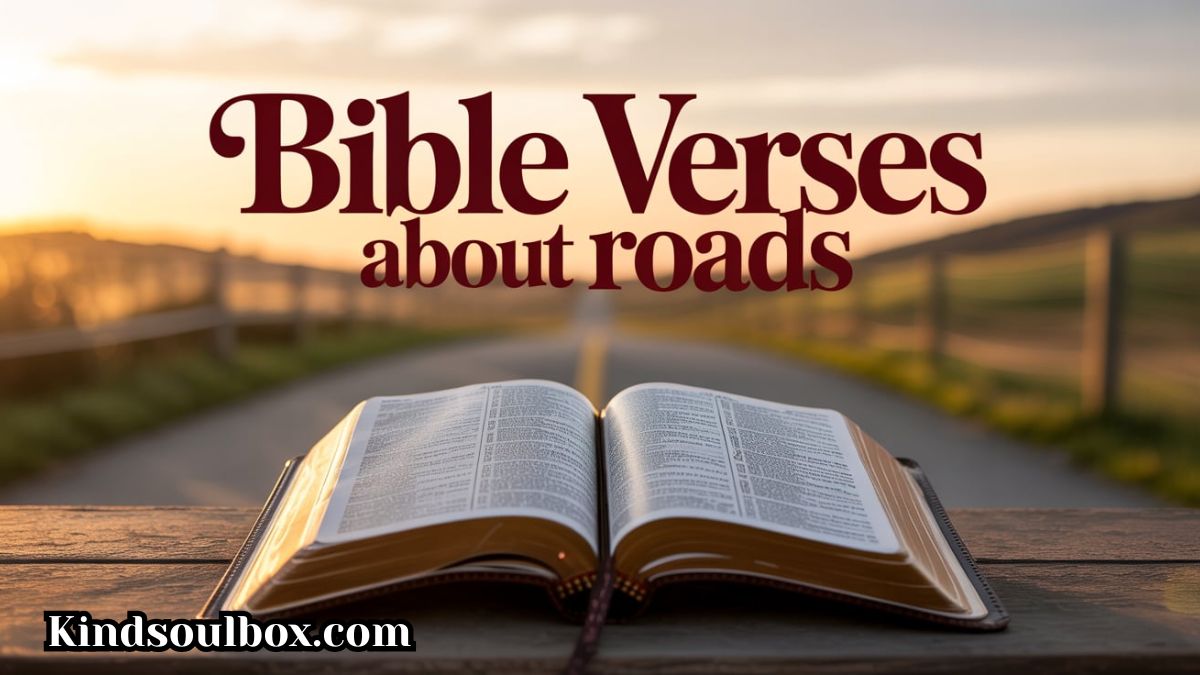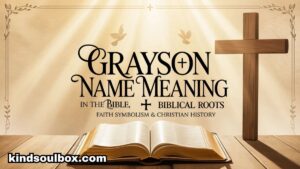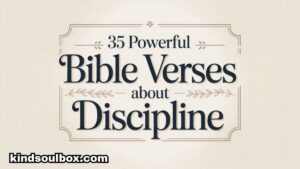Bible verses about roads are Scripture passages exploring literal and symbolic pathways that reveal profound truths about your spiritual journey, divine guidance, and eternal destiny. These biblical references transform ordinary roads into metaphorical highways pointing toward life’s most critical choices and directions.
Ancient roads carried prophets toward destiny-defining moments. They witnessed miraculous encounters, radical conversions, and life-altering revelations. When Scripture mentions paths, it’s unveiling your soul’s trajectory—whether you’re traveling the narrow path toward eternal life or drifting down the wide road leading to destruction.
These powerful passages illuminate biblical wisdom about decision-making, transformation, and walking in alignment with God’s guidance. From wilderness highways preparing the way for redemption to golden streets awaiting believers, Bible verses about roads map your entire spiritual path from earth to eternity.
The Two Roads: Choice and Consequence
Matthew 7:13-14 hits hard: “Enter through the narrow gate. For wide is the gate and broad is the road that leads to destruction, and many enter through it. But small is the gate and narrow the road that leads to life, and only a few find it.”
Jesus wasn’t describing actual gates in Jerusalem. He was revealing a fundamental truth about choices and directions in your spiritual path. The wide road? It’s crowded, comfortable, and requires zero effort. Everyone’s taking it. The narrow path? Tight, demanding, and sparsely traveled.
Why Jesus Chose This Imagery
First-century Judea had two types of roads. Roman highways were broad, paved, and engineered for armies. Local paths were narrow, winding through rocky terrain. Jesus’s audience understood immediately—one road was easy, the other required intention.
Biblical wisdom from Proverbs 14:12 reinforces this: “There is a way that appears to be right, but in the end it leads to death.” Appearances deceive. The comfortable path might feel correct, yet it terminates in spiritual ruin.
Jeremiah 21:8 presents the same dichotomy: “See, I am setting before you the way of life and the way of death.” No middle ground exists. You’re traveling one road or the other.
Modern Application
Your spiritual journey demands constant evaluation. Which road are you on? The wide road promises:
- Popularity and social acceptance
- Minimal spiritual discipline
- Self-directed living without alignment with God’s guidance
- Temporary comfort masking eternal consequences
The narrow path offers:
- Divine direction even when it’s unpopular
- Growth through sacred understanding
- Transformation that leads to eternal life
- Temporary struggle yielding permanent reward
| Wide Road Characteristics | Narrow Path Characteristics |
|---|---|
| Many travelers | Few finders |
| Easy entrance | Requires seeking |
| Self-directed | God-directed |
| Immediate gratification | Delayed fulfillment |
| Leads to destruction | Leads to life |
| Requires no sacrifice | Demands everything |
Highways Through the Wilderness: Redemption and Preparation

Isaiah 40:3-5 thunders across centuries: “A voice of one calling: ‘In the wilderness prepare the way for the Lord; make straight in the desert a highway for our God. Every valley shall be raised up, every mountain and hill made low; the rough ground shall become level, the rugged places a plain.'”
This prophecy found fulfillment in John the Baptist, but it speaks to something deeper—desolation and promise intertwined on the same road.
The Desert Road as Transformation Space
Why does God build highways through wilderness? Because spiritual transformation often requires isolation. The desert strips away distractions. When you’re surrounded by barren and fruitful extremes, you recognize your dependence on divine guidance.
Ancient Near Eastern kings sent road-builders ahead to prepare their route. Workers filled valleys, leveled mountains, and smoothed rough terrain. Isaiah was saying: God’s coming, and He’s fixing everything in His path.
Isaiah 35:8-10 expands this vision: “And a highway will be there; it will be called the Way of Holiness; it will be for those who walk on that Way. The unclean will not journey on it; wicked fools will not go about on it.”
This Highway of Faith represents:
- Sacred understanding purified from corruption
- A road reserved for the redeemed
- Divine intervention creating paths where none existed
- Redemption transforming isolation and hope into victory
Malachi 3:1 confirms: “See, I will send the Lord you are seeking will suddenly come to his temple; the messenger of the covenant, whom you desire, will come.”
Your Wilderness Highway
You might be in a wilderness season right now. Career collapsed. Relationship ended. Health failing. Financial pressure crushing you. The biblical wisdom here? God builds highways through desolation. Your wilderness isn’t wasted—it’s preparation for divine direction.
The Road to Emmaus: Revelation in Journey
Luke 24:13-35 tells an extraordinary story. Two disciples walked seven miles from Jerusalem to Emmaus, hearts shattered by Jesus’s crucifixion. A stranger joined them—Jesus Himself, though they couldn’t recognize Him.
Why a Road, Not a Building?
Jesus could’ve appeared anywhere. Temple. Upper room. Marketplace. He chose a road. Why? Because spiritual journeys happen in motion, not stagnation.
The disciples were processing grief, confusion, and shattered expectations. They needed to walk it out. Jesus met them in their movement, their questioning, their honest disappointment.
For seven miles, Jesus explained Scripture. He showed how everything pointed to Him. Their hearts “burned within them” as He taught. Yet recognition came only when He broke bread—a simple, intimate act at journey’s end.
What This Teaches About Encountering Christ
Your spiritual path includes ordinary roads. Commutes to work. Walks around your neighborhood. Daily routines that feel meaningless. Jesus shows up there. Not just in church or Bible study—though those matter—but in the unremarkable moments of life.
The Emmaus road experience reveals:
- Divine guidance often comes in disguise
- Sacred understanding builds gradually, not instantly
- Community matters—these disciples traveled together
- Recognition requires openness to spiritual teachings
Quote from the passage: “Were not our hearts burning within us while he talked with us on the road and opened the Scriptures to us?”
That burning? That’s holy wisdom igniting your soul. It happens when Scripture knowledge connects with lived experience on the road of life.
Damascus Road: Radical Transformation
Acts 9:1-19 contains one of history’s most dramatic conversions. Saul, breathing murderous threats against Christians, traveled toward Damascus to arrest believers. Then light from heaven knocked him down. Jesus spoke. Saul went blind. Everything changed.
The Road as Interruption Point
Saul had plans. Clear direction. Absolute certainty. He was on a mission backed by religious authority. Then God interrupted. The Damascus road became the pivot point where persecutor became apostle, Saul became Paul, and the early church gained its greatest theologian.
Divine intervention doesn’t always wait for convenient moments. Sometimes God stops you mid-journey, blinds you to your own plans, and redirects your entire life. The road becomes the classroom where transformation happens.
Personal Application: Course Correction
You might be traveling with absolute confidence toward the wrong destination. Career path that promises success but costs your soul. Relationship moving toward commitment despite red flags. Ministry built on ambition rather than alignment with God’s guidance.
The Damascus road experience teaches:
- Godly instruction sometimes comes as disruption
- Blindness—inability to see your own way—precedes clarity
- Surrender opens doors spiritual guidance can’t penetrate otherwise
- Radical life-changing potential exists at any moment
Paul later wrote in Philippians 3:7-8: “But whatever were gains to me I now consider loss for the sake of Christ. What is more, I consider everything a loss because of the surpassing worth of knowing Christ Jesus my Lord.”
The road changed everything.
Preparation and Clearing: Making Straight Paths
Proverbs 3:5-6 offers perhaps Scripture’s most beloved promise: “Trust in the Lord with all your heart and lean not on your own understanding; in all your ways submit to him, and he will make your paths straight.”
Unpacking “Straight Paths”
Straight doesn’t mean easy. It means direct, purposeful, aligned. When you trust divine direction rather than your limited perspective, God removes unnecessary detours. He clears obstacles you can’t see. He straightens what your efforts would’ve twisted.
Isaiah 26:7 adds: “The path of the righteous is level; you, the Upright One, make the way of the righteous smooth.” Level ground for those walking in righteousness. Not because they’ve earned it, but because holy direction prepares the way.
Psalm 37:23 confirms: “The Lord makes firm the steps of the one who delights in him.” Firm steps. Solid footing. Confidence on uncertain terrain. That’s what godly instruction provides.
Practical Wisdom: Removing Obstacles
Your spiritual journey accumulates debris. Unforgiveness clutters the path. Anxiety creates mental roadblocks. Sin digs potholes that trip you repeatedly. Clearing your path requires:
- Repentance as spiritual road maintenance
- Obedience paving the way forward
- Scripture knowledge as your navigation system
- Community helping remove obstacles you can’t shift alone
Dangerous Roads and Divine Protection
Ancient roads were brutal. Bandits hid in rocky passes. Wild animals prowled. Exposure killed. Travelers faced genuine threats with every journey.
Psalm 91:11-12 promises supernatural protection: “For he will command his angels concerning you to guard you in all your ways; they will lift you up in their hands, so that you will not strike your foot against a stone.”
Real Dangers, Real Protection
Proverbs 22:5 warns: “In the paths of the wicked are snares and pitfalls, but those who would preserve their life stay far from them.” The wrong road doesn’t just lead to the wrong destination—it’s actively dangerous.
The Good Samaritan parable (Luke 10:25-37) takes place on the notoriously dangerous road from Jerusalem to Jericho. A man gets beaten, robbed, and left half-dead. Two religious leaders pass by. A Samaritan—despised by Jews—stops and helps.
This story reveals:
- Compassion and equality matter more than religious credentials
- Fellowship paths cross ethnic and social boundaries
- Kindness and fairness define true spiritual teachings
- The dangerous road exposes character
Your Dangerous Roads
You face spiritual dangers daily. Temptation ambushes you. Discouragement waits around corners. Toxic relationships set traps. Financial pressure creates vulnerability. But divine guidance doesn’t abandon you on dangerous roads. Heavenly counsel provides:
- Wisdom to avoid unnecessary risks
- Strength when you must travel difficult paths
- Community roads so you don’t journey alone
- Sacred advice illuminating hidden dangers
The Way, Not Just a Way
John 14:6 contains Jesus’s exclusive claim: “I am the way and the truth and the life. No one comes to the Father except through me.”
Why Road Metaphor for Salvation?
Jesus didn’t say He knows the way or teaches the way. He IS the way. This transforms spiritual path imagery completely. You’re not just following directions—you’re following a Person. The road and the guide merge into one.
Psalm 16:11 foreshadows this: “You make known to me the path of life; you will fill me with joy in your presence, with eternal pleasures at your right hand.” The path of life connects directly to God’s presence.
Interestingly, early Christians were called followers of “The Way” (Acts 9:2). Before “Christian” became the label, believers identified by the road they traveled. Their spiritual journey defined their identity.
Old Testament Precedent
This wasn’t new theology. The concept of God as the path runs throughout biblical wisdom:
- Deuteronomy 5:33: “Walk in obedience to all that the Lord your God has commanded you”
- Psalm 25:4: “Show me your ways, Lord, teach me your paths”
- Isaiah 2:3: “Come, let us go up to the mountain of the Lord… He will teach us his ways, so that we may walk in his paths”
Divine direction isn’t abstract philosophy. It’s embodied in Jesus, who walked dusty Palestinian roads and calls you to follow.
Crossroads: Decision Points in Scripture
Jeremiah 6:16 issues a powerful invitation: “This is what the Lord says: ‘Stand at the crossroads and look; ask for the ancient paths, ask where the good way is, and walk in it, and you will find rest for your souls.'”
Standing at the Crossroads
Crossroads force decisions. You can’t keep walking straight—you must choose. Biblical wisdom tells you to pause. Look. Ask. The ancient paths aren’t outdated—they’re time-tested routes to sacred understanding.
But Jeremiah adds a tragic conclusion: “But you said, ‘We will not walk in it.'” Stubborn refusal despite clear divine guidance. The crossroads reveals character. Will you seek holy wisdom or insist on your own way?
Deuteronomy 30:19 presents the ultimate crossroads: “This day I call the heavens and the earth as witnesses against you that I have set before you life and death, blessings and curses. Now choose life, so that you and your children may live.”
Ruth at the Crossroads
Ruth 1:16-17 shows crossroads faithfulness. Naomi urged her daughters-in-law to return home. Orpah left. Ruth stayed, declaring: “Where you go I will go, and where you stay I will stay. Your people will be my people and your God my God.”
Ruth chose the harder road. She walked away from security, familiarity, and cultural comfort. Her decision at the crossroads led her into Jesus’s genealogy. Her spiritual journey became part of redemption history.
Your Crossroads Today
You’re standing at crossroads right now. Career decisions. Relationship commitments. Geographical moves. Ministry opportunities. Financial choices and directions. The question isn’t whether crossroads exist—it’s whether you’ll pause long enough to seek godly instruction before choosing.
Roads of Fellowship: Walking Together
Ecclesiastes 4:9-12 celebrates companionship: “Two are better than one, because they have a good return for their labor: If either of them falls down, one can help the other up. But pity anyone who falls and has no one to help them up… Though one may be overpowered, two can defend themselves. A cord of three strands is not quickly broken.”
The Power of Traveling Together
Roads of fellowship aren’t just nice—they’re essential for survival. Solo spiritual journeys leave you vulnerable. Traveling with others provides:
- Accountability when temptation strikes
- Encouragement when discouragement attacks
- Practical help when you stumble
- Different perspectives broadening your scripture knowledge
- Shared joy multiplying victories
Amos 3:3 asks pointedly: “Do two walk together unless they have agreed to do so?” Unity trails require agreement. You can’t walk close with someone heading the opposite direction.
Road Encounters That Built the Church
Acts 8:26-40 tells of Philip meeting an Ethiopian official on the Gaza road. The man was reading Isaiah but couldn’t understand. Philip explained Jesus, baptized him, and sent him home carrying the gospel to Africa.
Random road encounter? No. Divine intervention orchestrating fellowship paths that advance His kingdom. The Ethiopian’s spiritual journey intersected with Philip’s obedience, creating life-changing potential.
Roads of fellowship demonstrate compassion and equality. Jesus walked with tax collectors and sinners. The early church welcomed slaves and free, Jews and Gentiles, rich and poor. Community roads transcend human barriers because empathy and justice flow from divine guidance.
The Final Road: Streets of Gold
Revelation 21:21 describes the ultimate destination: “The great street of the city was of gold, as pure as transparent glass.” From dusty Palestinian paths to golden streets. From dangerous, rocky roads to perfected highways reflecting God’s glory.
Journey’s End as New Beginning
Eternal life isn’t static. It’s movement, exploration, and endless discovery on roads that never deteriorate. The Highway of Faith doesn’t terminate—it transforms into something unimaginably better.
Revelation 22:1-2 expands the vision: “Then the angel showed me the river of the water of life, as clear as crystal, flowing from the throne of God and of the Lamb down the middle of the great street of the city. On each side of the river stood the tree of life.”
Life-giving water. Healing trees. Golden streets. This is where your spiritual path leads if you choose the narrow path now.
Isaiah 11:16 prophesied: “There will be a highway for the remnant of his people… as there was for Israel when they came up from Egypt.” The Exodus road through the Red Sea foreshadows the final highway into eternal life.
The Great Highway
Every biblical road points here. The narrow path? It leads to golden streets. The Damascus road? Changed lives walking toward glory. The wilderness highway? Preparation for paradise. The Emmaus road? Revelation culminating in complete recognition.
Your current struggles on the spiritual journey aren’t random. They’re preparing you for streets of gold. Bible Verses About Roads. Desolation and promise merge at the finish line.
Practical Application: Your Road Today
Biblical wisdom demands action, not just knowledge. These Bible verses about roads transform your life only when you apply them. Here’s how:
Assessing Which Road You’re Traveling
Honest self-evaluation matters. Ask yourself:
- Does my path align with divine guidance or personal preference?
- Am I traveling with others committed to the narrow path?
- Do I experience the “burning heart” of spiritual teachings or cold routine?
- Would I want my children following my current trajectory?
Course Corrections: Biblical Examples
Scripture celebrates people who changed paths:
- Peter: Denied Jesus, then became the rock
- Paul: Persecutor transformed into apostle
- Jonah: Ran from God, eventually obeyed
- Prodigal Son: Far country to father’s house
Repentance means changing direction. It’s never too late for a Damascus road moment. Transformation awaits those willing to admit they’re on the wrong road.
Creating Waymarkers
Ancient travelers stacked stones as navigation aids. Create spiritual path waymarkers:
- Daily Scripture reading providing sacred understanding
- Prayer cultivating alignment with God’s guidance
- Accountability relationships offering kindness and fairness
- Service opportunities developing compassion and equality
- Sabbath rest preventing burnout on the journey
Walking with Others Versus Going Alone
The spiritual journey wasn’t designed for solo travelers. Find your community roads:
| Solo Journey Risks | Community Journey Benefits |
|---|---|
| Pride blinds you | Others provide perspective |
| No accountability | Regular check-ins keep you honest |
| Isolation feeds despair | Fellowship brings encouragement |
| Limited resources | Shared wisdom and strength |
| Easier to quit | Commitment to others sustains you |
Conclusion
Bible verses about roads aren’t random geographical details. They’re metaphorical highways revealing your character, destiny, and need for divine direction. Every biblical road invites you into a deeper spiritual journey. Bible Verses About Roads. Your current path matters eternally. The choices and directions you make today determine where you’ll stand tomorrow. Choose the narrow path. Seek alignment with God’s guidance rather than crowd approval.
Bible verses about roads teach one essential truth: you’re already traveling. The question isn’t whether you’re on a road—it’s which road you’ve chosen. Bible Verses About Roads. The wide road promises comfort but delivers destruction. The narrow path demands everything but leads to eternal life. Bible Verses About Roads. Stand at your crossroads today. Look for the ancient paths. Bible Verses About Roads. Walk with Jesus, who said, “I am the way.” Your spiritual journey begins now.
FAQS
Q: What does the Bible say about the narrow road?
A: Matthew 7:13-14 describes the narrow road as the difficult path leading to eternal life, traveled by few. It requires divine guidance and intentional choices and directions rather than following the crowd.
Q: What is the significance of the Damascus Road in the Bible?
A: The Damascus Road in Acts 9:1-19 marks where Saul encountered Jesus and transformed into Paul. This spiritual journey demonstrates God’s life-changing potential through divine intervention and radical conversion.
Q: Which Bible verse talks about making your paths straight?
A: Proverbs 3:5-6 promises that trusting God completely leads to straight paths. This biblical wisdom teaches that alignment with God’s guidance removes unnecessary detours and obstacles from your spiritual path.
Q: What does the Highway of Holiness mean in Isaiah?
A: Isaiah 35:8 describes the Highway of Holiness as a sacred road reserved for the redeemed. This metaphorical highway represents purified spiritual teachings and God’s path toward redemption and eternal life.
Q: How many times does the Bible mention roads or paths?
A: The Bible references roads, paths, and ways over 500 times across both testaments. These Bible verses about roads consistently emphasize choices and directions, divine guidance, and the importance of your spiritual journey toward righteousness.









